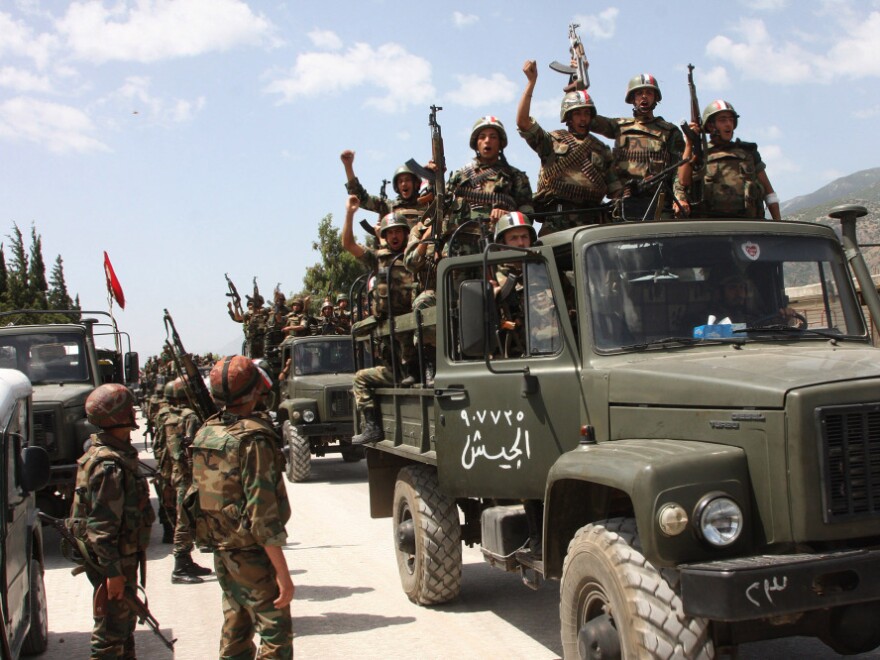Every Syrian is feeling the economic pain of a seven-month uprising and Western sanctions to end a bloody crackdown on anti-government protesters.
But shopkeepers tell a different story along a street of open-air shops in the Midan neighborhood in central Damascus. A government escort accompanies an NPR reporter for interviews about the sensitive subject of tightening economic sanctions against Syria.
Hassan Shagharouri runs a sweets shop. When asked if prices are rising, he responds that the prices are the same and that everything is perfect.
It's the same answer at Bishar al-Kassam's electronics shop: Nothing has changed; it remains as it was.
The answers to an American reporter are so upbeat that even the government escort shakes his head and says he doesn't know why the shop owners are all lying.
This week, the European Union tightened the sanctions yet again by freezing the assets of the Commercial Bank of Syria.

In this photo taken during a government-organized visit for media, Syrian army soldiers shout slogans in support of Assad as they enter a village near the town of Jisr al-Shughour on June 10. Ongoing military operations to crush anti-government protest are draining money from the national budget.
Continuing Hardship, Uncertainty
Western sanctions are designed to target the government and pressure President Bashar Assad, but every Syrian is grappling with the punishment. For the poor, eggs and meat are now out of reach. For the well-to-do, international banks have stopped processing personal credit cards. For merchants, there is a collapse in demand, says Nabil Sukkar, a former World Bank official who runs an independent research center in Damascus.
"There is tremendous depression because there is still no light at the end of the tunnel," he says. "They don't know where the economy is heading."
It's not just the sanctions, says Sukkar — the uprising has had an even bigger impact on the economy. The uncertainty has shut down the tourism sector and dried up foreign investment. And there's another price to pay for the massive government crackdown: The army has been deployed in Syrian cities for months.
"Of course, there is a cost for that military operation. ... The money has to come from our budget," Sukkar says.
Government revenues are likely to shrink as the European Union's ban on Syrian oil imports comes into force in November. Syria has to find new buyers for a product that makes up one-third of all state revenues — so the economic pain is expected to worsen significantly.
Undoing Economic Reforms
A trendy street in Damascus, with a row of brand-name coffeehouses, restaurants and designer clothing shops, is a symbol of the economy built by President Assad over more than a decade in power.
Assad introduced a market economy, enriched the business elite and created a consumer culture in Syria after he inherited the presidency from his father, Hafez Assad.
"Many people saw in Bashar a modernist, at least someone who could introduce a certain atmosphere of liberalism, access to imported goods of a quality which was inexistent under his father," says Peter Harling of the International Crisis Group.
But now, the economic crisis threatens to push Syria back to the 1980s, with long lines for locally produced goods, says Harling.
"The problem for the regime is that this is a prospect which its base of support, what's left of its base of support, resents," he says.
Potential Backlash
But that resentment could backfire if Western sanctions hurt average Syrians more than the regime, says newspaper editor Waddah Abed Rabbo.
"When you hear the European or the American tell you sanctions will not affect the Syrian people, it's not true, because we are all affected by the sanctions. Normally, the regime is not affected by all this," he says.
The regime can rally the country, demand sacrifices with an anti-American campaign, says Rabbo. Most Syrians are unprepared for this economic disaster, but the regime, he says, has a system in place.
"These people know exactly how to live under sanctions. They adapt. They adapt their life on sanctions," Rabbo says.
Those in Western capitals waiting for the regime to crack under the pressure, he says, have longer to wait.
Copyright 2021 NPR. To see more, visit https://www.npr.org.




